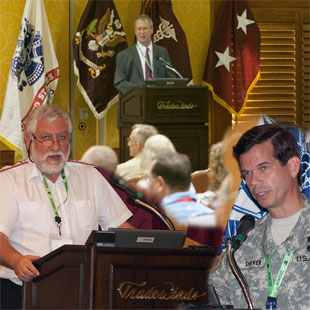Researchers unite for warfighters at Combat Casualty Care conference
St. Pete's Beach, Fla. has once again opened its arms and is welcoming leaders in military medicine at the Advanced Technology Applications for Combat Casualty Care 2010 conference.
The conference which will run through Aug.19 is packed with events.
The meeting brings together experts to discuss experiences in product development and collaborative efforts that allow for the latest advances in military medicine to support the Warfighter.
Dr. Frazier Glenn, principal assistant for Research and Technology of the U.S. Army Medical Research and Materiel Command opened the conference by saying, "The Department of Defense has invested more money this year than previous years towards new medical research for the Soldier. As a trusted partner, MRMC looks forward to advances in medicine by working with academia and industry to make it happen."
The first day provided attendees the opportunity to hear from the Iraqi Surgeon General, Maj. Gen. Samir Abdullah Hassan, who discussed the progression of medicine in his native country. Since 2003 and the transition of a new government, the number of qualified physicians and medical supplies has increased. Between five and six years, they anticipate nearly 100% of their needs to be met.
Military medicine is often at the forefront of medical research. Often, the needs of Soldiers are identified and through collaborative efforts, those needs directly evolve into products licensed by the U.S. Food and Drug Administration. Many can be found in civilian emergency rooms protecting public health.
Surgeon Commodore Alasdair Walker, medical director of the Joint Medical Command in the United Kingdom stressed the importance of having a qualified military medical staff who can collaborate effectively and obtain answers to real problems. With multinational technology and supportive partnerships, the future of successful collaboration is about bringing all the information together for the best care for our Soldiers.
Walker said, "It's more complicated than the research and the equipment, it's about the people involved. They all come together to produce what is best for the patient."
The meeting will continue to address topics throughout the week which directly affect the survivability and quality of life of Soldiers. Research on traumatic brain injury, control of blood loss, wound infections and critical care transport are some of the many discussions that attendees are able to hear.
 An official website of the United States government
An official website of the United States government
 ) or https:// means you've safely connected to the .mil website. Share sensitive information only on official, secure websites.
) or https:// means you've safely connected to the .mil website. Share sensitive information only on official, secure websites.



